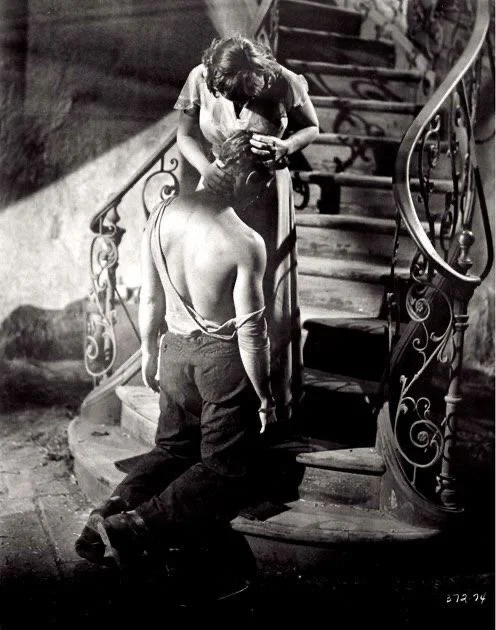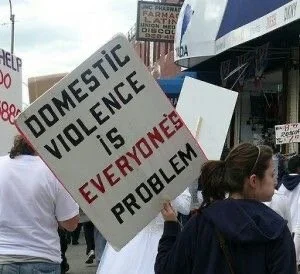Under the Microscope: My Story with Domestic Abuse and the Importance of Community
By Isabella Kelly-Goss
According to the National Domestic Violence Hotline, 4 out of 5 victims who reported intimate partner violence from 1994 through 2010 were women. Women aged 18 through 24, then 25 through 34, experience the highest rates of this violence.
I was almost 19 when I met a boy on a dating app that I thought I fell deeply in a mutual love with. Despite trying many times, I would not leave him for four years, when I was 22.
It takes victims an average of seven times to leave before they don’t return. It took me at least eight, though around year three, I began to lose count. Every time I was almost gone, he would fill my head with pleas of change and sorrow, riddled with the ideas of guilt and abandonment.
I don’t typically label myself as a victim or a survivor. Truth be told, most days now I forget.
Still from A Streetcar Named Desire (1951)
I don’t forget the times he laughed at me while I was crying, the times he would send me nasty texts, or the time my mother begged me not to go home with him on Christmas after he had pinched me under the table to stop talking. I don’t forget the time she made me move home after the second time I caught him being unfaithful and cried so hard that my nose bled for almost an hour, or the time he called me a whore repeatedly and did not stop until I was on the ground, my head in his lap, begging for forgiveness, for him to stop.
But I do forget that he was wrong. I forget that what he did was abuse and not just something that happened that didn’t make me feel nice about myself. It happened so long and so often that it was normal. To most people, we were. For most people, my friends included, they had no idea.
Around year two was when he began taking full control. I had left him for around three months when I was 20. The lost months, I entered what would probably now be diagnosed as PTSD related mania. Eventually, I went back because it was just easier.
64% of women who experience intimate partner violence will suffer from PTSD. Only 32% will seek mental health assistance.
After that, his criticism was subtler, calculated. After that, my friends, my clothes, my hair, and my hobbies were all monitored by him. He cheated on me with teenagers and internet strangers, long and short term, to boost his ego, to show that he could. Marriage was dangled over my head, like a prize or reward for doing as I was asked. The thought was revoked when I did something displeasing. I lived under a microscope.
I had been accepted to transfer into a university about an hour and a half away while we were broken up in late March. By July, I told all my friends I couldn’t afford it and scrambled to find someone to take over my lease. The reality was that he strongly insinuated he would cheat on me again if I left, that he wouldn’t want to marry the whore who went away to college. To this day, I’ve never told my friends the truth.
By year three, he controlled everything. I drove his car, wore clothes selected and purchased by him in a style he desired, and spent my money according to his wants and needs. There are enough horror stories to fill an entire memoir. My whole life revolved around him, and that was exactly how he wanted it.
He held everything he could over me to keep me under his thumb. Every argument, right or wrong, was won by his “I bought this for you, I can take it back.”
The last time he tried to make a purchase on my behalf was for a car. He offered 4 months before I left for the last time. I assumed he was serious, genuine, that he had really changed, as he hadn’t even done anything he needed to make up to me this time. I found out two weeks later that he had been messaging girls online and paying them. It was after this that I decided that in order to make our relationship work, I needed to find myself and forgive myself, as well as him.
Instead, I found my voice. I found friendship and community. Two of my dearest friends would meet me at a coffee shop, listening, helping me to leave. If he found out they were there, I would tell him I “ran into them.” With their encouragement, and my mother’s, I found the strength to leave.
On more than one occasion, I packed up all of my things, only to unpack them a few hours later. Two days before I left, I realized the man I loved didn’t exist; he was a facade to keep me under control. I told him I didn’t love him anymore, but he begged me to stay under the promise that he could “make me love him again.” The truth is, studies have proven that abusers take decades to change their ways, and they’re unlikely to do so with the same partner.
Another study by Capaldi, D. M., Knoble, N. B., Shortt, J. W., & Kim, H. K. in 2012 has proven there is a link between strong community relationships and protection against intimate partner violence. I called my mother, I texted my friends, and I told them I was done. I left the next day and moved back into my mother’s house.
I left, and had somewhere to go, and after blocking him everywhere, I haven’t heard from him in nearly two years. I am in a healthy, loving relationship, and have exceeded all of his– and consequently my– expectations and began building an actual career. I have my friends, my independence, my life back.
Yet, some days I still walk around feeling like his words are tattooed on my skin for everyone to see. I have been diagnosed with PTSD directly correlating to his abuse, and have been told by doctors and nurses that the physical symptoms and rashes I experienced were likely due to what I endured.
According to a study conducted by Ann L Coker, Paige H Smith, and Mary K Fadden in 2005, women who experience DV are almost twice as likely to report physical and chronic illnesses or disabilities such as chronic unsourced pain, arthritis, and even heart problems.
And still, I am one of the lucky ones. According to the CDC, homicide is one of the leading causes of death of women in the United States under the age of 44.
“Across all racial/ethnic groups of women, over half of female homicides for which circumstances were known were IPV-related, with >90% of these women being killed by their current or former intimate partner,” they say.
With the rise in influence from men like Andrew Tate, Charlie Kirk, and Harrison Butker, we need to talk about just how common domestic abuse is. We need to build a community to support and believe in each other.
Image Sourced through Pinterest
According to a study conducted by the University of Bristol and Women Said UK, research has shown “that sexism and misogyny set the scene for male abusive partners’ coercive and controlling behaviors.”
Earlier this month, National Secretary of Defense Pete Hegseth personally attended the opening of a church with direct ties to Christian Nationalist Douglas Wilson. Wilson has openly supported the repeal of women’s right to vote. The building in which the service took place is owned by Donald Trump’s former chief of staff, Mark Meadows.
Hegseth has many allegations in regards to infidelity and sexual assault.
On September 8, Donald Trump dismissed domestic violence as a real crime during a speech at the D.C. Museum of the Bible.
“Much lesser things, things that take place in the home, they call a crime,” he said, “you know, they’ll do anything they can to find something. If a man has a little fight with the wife, they say ‘This was a crime.’”
A Hyper-Patriarchal fascist regime isn’t just coming, it’s here. Domestic violence, and worse, comes with it.
If we don’t start banding together now, it won’t just be four years. It doesn’t take a government; it takes a village. Community amongst women and allies has aided us through suffrage, civil rights, the second wave of Feminism, and on, and that’s only in the last 100 years.
Women have only had the right to own a bank account since 1974. Financial abuse is a precursor of worse yet to come. Women have only had the federal right to “No-Fault Divorce” since 2010. Before that, women had to prove their spouse’s infidelity or abuse.
Rights are being repealed and threatened every day. As they repeal more, more violence towards women will ensue.
I don’t want to live under a microscope again, do you?


